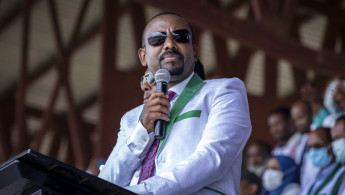Ethiopia PM Abiy's party wins overwhelming majority in vote: results
Ethiopia's ruling party has won an overwhelming majority in a landmark parliamentary poll, the electoral board said Saturday, ensuring a new five-year term for Prime Minister Abiy Ahmed.
The June 21 election marked the first time Abiy faced voters since being appointed prime minister in 2018 following several years of anti-government protests.
Abiy, winner of the 2019 Nobel Peace Prize, had hoped to frame victory at the ballot box as a mandate for political and economic reforms and military operations.
But the poll was held in the midst of a gruelling conflict in Ethiopia's northern Tigray region that has battered Abiy’s global reputation and raised fears of widespread famine.
Abiy's Prosperity Party won more than 400 seats out of a total of 436 where elections were held, according to results issued by the National Election Board of Ethiopia (NEBE) at a gathering in Addis Ababa.
The vote was meant to affirm a promised democratic revival in Africa's second-most populous nation, with Abiy vowing a clean break with repression that tarnished past electoral cycles.
The ruling coalition that preceded Abiy claimed staggering majorities in 2015 and 2010 polls that observers said fell far short of international standards for fairness.
A more open contest in 2005 saw big opposition gains but led to a lethal crackdown on protests over contested results.
Twice delayed
This time, the polls were delayed twice - once for the coronavirus pandemic, and again to allow officials more time to prepare.
Documents from the NEBE issued Saturday showed the PP winning 421 seats but then it said there would have to be a re-run election in 10 constituencies and a recount in three more
Even with the extra time voting did not go ahead in around one-fifth of the country's 547 constituencies. A second batch of voting is due to take place on September 6 in many of those left out.
Some areas were deemed too insecure, plagued by ethnic violence that has worsened under Abiy.
In other cases the electoral board was hamstrung by printing errors on ballot papers and other logistical setbacks.
The announcement of final results was also later than expected because of delayed counts and complaints by political parties.
But there is no election date set for Tigray, where fighting marked by myriad atrocities raged for eight months before federal troops withdrew at the end of June in the face of rebel advances and Abiy's government declared a unilateral ceasefire.
Muted campaign
The situation remains precarious, with analysts warning of potential further fighting in western Tigray and some world leaders denouncing a "siege" blocking desperately-needed aid for a region where hundreds of thousands face famine.
Campaigning was muted even in some areas where voting did take place, with opposition parties complaining of a tilted playing field.
In Abiy's native Oromia region, Ethiopia's largest, two of the most prominent opposition parties -- the Oromo Federalist Congress and the Oromo Liberation Front -- pulled out entirely, saying their candidates had been arrested and offices vandalised.
The most competitive regions were Amhara, the country's second-largest, and the capital Addis Ababa.
Election day saw "no serious or widespread human rights violations" in stations observed by the state-affiliated Ethiopian Human Rights Commission (EHRC).
Yet in a preliminary report the EHRC noted that some constituencies experienced "improper arrests", voter intimidation and "harassment" of observers and journalists.
The EHRC also said it had observed several killings in the days leading up the vote in Oromia.
Deep political cleavages
The opposition National Movement for Amhara filed a complaint to the electoral board over "serious problems" during the vote.
"A lot of our observers were beaten and chased down by militias of the ruling party," senior party member Dessalegn Chanie told AFP.
Dessalegn is one of the opposition politicians who has so far won a spot in the federal parliament, though he said the party would decide whether to take its seats only after the electoral board rules on its complaints.
Even a small amount of opposition representation in parliament would be an improvement and could fend off future instability, said Addisu Lashitew of the Brookings Institution in Washington.
"People, especially the youth, they need to be heard, so they should have a voice in the political process," Addisu said. "Even if it may not be always successful in influencing political decisions, the fact that they are heard itself is important."
Incorporating opposition voices into formal political processes means they are less likely to become "radicalised" or spur a large-scale protest movement, he added.
The Prosperity Party "shouldn't read too much" into the results given the "deep political cleavages" that remain, Tegbaru Yared, a researcher with the Institute for Security Studies, wrote this week.
Instead the party "should focus on stabilising the country, stopping intercommunal conflicts, managing inflation, engaging the opposition and initiating an all-inclusive national dialogue," Tegbaru wrote. "This could earn it popular legitimacy."





 Follow the Middle East's top stories in English at The New Arab on Google News
Follow the Middle East's top stories in English at The New Arab on Google News


